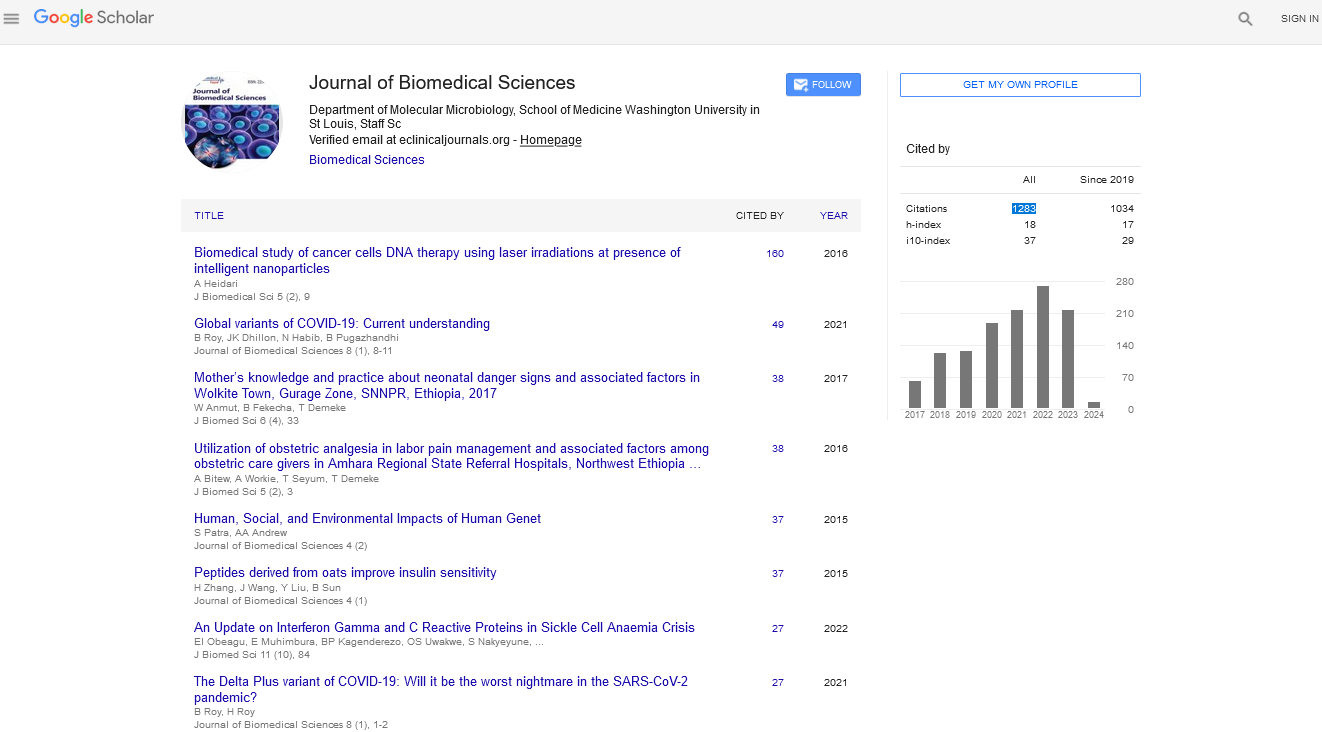Perspective - (2024) Volume 13, Issue 3
Advancing Healthcare with Personalized Treatment: The Precision Medicine Revolution
Mario Agapito*
Department of Medicine, University of Milan, Italy
*Correspondence:
Mario Agapito, Department of Medicine, University of Milan,
Italy,
Email:
Received: 17-May-2024, Manuscript No. IPJBS-24-14873;
Editor assigned: 19-May-2024, Pre QC No. IPJBS-24-14873 (PQ);
Reviewed: 03-Jun-2024, QC No. IPJBS-24-14873;
Revised: 11-Jun-2024, Manuscript No. IPJBS-24-14873 (R);
Published:
19-Jun-2024
Introduction
In the realm of modern medicine, the concept of "one size fits
all" is being rapidly replaced by a more tailored approach known
as precision medicine. This innovative approach to healthcare
takes into account individual variability in genes, environment,
and lifestyle to provide personalized treatment and prevention
strategies. In this article, we will delve into the principles,
applications, challenges, and future prospects of precision
medicine, exploring how it is transforming the landscape of
healthcare.
Description
Understanding precision medicine
Precision medicine, also known as personalized or stratified
medicine, is a medical model that customizes healthcare
decisions and practices to individual patients. It acknowledges
that each person's genetic makeup, lifestyle, and environmental
factors influence their susceptibility to diseases and response to
treatments. By leveraging advancements in genomics, molecular
biology, data science, and technology, precision medicine aims
to optimize patient outcomes while minimizing adverse effects.
Key principles of precision medicine
Precision medicine is guided by severalkey principles:
Genomic analysis: Central to precision medicine is the analysis
of an individual's genetic information, including variations in DNA
sequences, gene expression patterns, and epigenetic
modifications. This allows healthcare providers to identify
genetic mutations associated with diseases and tailor treatments
accordingly.
Personalized treatment: Treatment decisions are based on a
patient's unique genetic profile, medical history, lifestyle factors,
and preferences. This may involve selecting medications, dosage
levels, and treatment modalities that are most effective and
least likely to cause adverse reactions.
Early disease detection: Precision medicine emphasizes early
detection and intervention to prevent or mitigate the
progression of diseases. Screening tests, biomarker analysis, and
predictive analytics are used to identify individuals at risk and
implement preventive measures or targeted therapies.
Data integration and analysis: Precision medicine relies on
the integration and analysis of diverse data sources, including
genetic data, clinical records, imaging studies, and environmental
exposures. Advanced computational tools and artificial
intelligence facilitate the interpretation of complex datasets to
guide clinical decision-making.
Applications of precision medicine
Precision medicine has applications across various medical
specialties and disease areas:
Oncology: In cancer treatment, precision medicine has
revolutionized therapy selection by targeting specific genetic
mutations or biomarkers driving tumor growth. Molecularly
targeted therapies, immunotherapies, and companion diagnostics
enable more effective and less toxic treatments tailored to
individual patients.
Cardiology: In cardiology, genetic testing can identify inherited
cardiovascular conditions, such as familial hypercholesterolemia
and hypertrophic cardiomyopathy, allowing for early intervention
and personalized risk stratification. Pharmacogenomic testing also
guides the selection and dosing of medications for conditions like
hypertension and arrhythmias.
Neurology: Precision medicine holds promise for
neurodegenerative diseases such as Alzheimer's disease and
Parkinson's disease, where genetic factors play a significant role.
Genetic testing and biomarker analysis aid in early diagnosis,
disease monitoring, and the development of targeted therapies
to slow disease progression.
Rare diseases: For patients with rare and genetic disorders,
precision medicine offers hope where traditional treatments
may have been ineffective. Whole exome sequencing and gene
editing technologies enable the identification of rare genetic
variants and the development of personalized therapies,
including gene therapy and enzyme replacement therapy.
Infectious diseases: Precision medicine is transforming the
management of infectious diseases by identifying genetic
determinants of drug resistance and susceptibility. Genomic surveillance helps track the spread of pathogens, while host
genomics informs the selection of antiviral and antibiotic
treatments tailored to individual patients.
Challenges and limitations
Despite its promise, precision medicine faces several challenges
and limitations:
Data privacy and security: The integration of large-scale
genomic and health data raises concerns about patient privacy,
data security, and ethical considerations surrounding informed
consent and data sharing.
Health inequities: Access to precision medicine technologies
and treatments may exacerbate existing health disparities, as
marginalized populations may lack access to genetic testing,
specialized care, and targeted therapies.
Cost and reimbursement: The high cost of genomic
sequencing, molecular diagnostics, and targeted therapies may
limit widespread adoption of precision medicine, particularly in
resource-constrained healthcare systems.
Interpretation of genetic variants: Variants of uncertain
significance, genetic heterogeneity, and gene-environment
interactions present challenges in interpreting genetic test
results and translating them into actionable clinical insights.
Infrastructure and workforce training: Implementation of
precision medicine requires investment in healthcare
infrastructure, workforce training, and interdisciplinary
collaboration among clinicians, geneticists, bioinformaticians,
and data scientists.
Future directions
Despite these challenges, precision medicine holds immense
promise for the future of healthcare:
Advancements in technology: Continued advancements in
genomic sequencing, molecular diagnostics, and artificial
intelligence will enhance the accuracy, efficiency, and
affordability of precision medicine approaches.
Population health and preventive medicine: Precision
medicine will increasingly shift towards population health
initiatives, focusing on disease prevention, early detection, and
personalized interventions to improve public health outcomes.
Patient empowerment and engagement: Patients will play a
more active role in their healthcare decisions, empowered by
access to their genetic data, personalized health information,
and opportunities for participatory research and clinical trials.
Global collaboration: International collaborations and data
sharing initiatives will accelerate research, improve data quality,
and broaden the reach of precision medicine to diverse
populations worldwide.
Integration with digital health: Precision medicine will
integrate with digital health technologies such as wearable
devices, mobile health apps, and telemedicine platforms to
enable real-time monitoring, remote patient management, and
personalized health interventions.
Conclusion
In conclusion, precision medicine represents a paradigm shift
in healthcare, offering the potential to revolutionize diagnosis,
treatment, and prevention strategies across a wide range of
diseases. By harnessing the power of genomics, data science,
and interdisciplinary collaboration, precision medicine holds the
promise of delivering more effective, targeted, and personalized
care to individuals while advancing the broader goals of public
health and population well-being.
Citation: Agapito M (2024) Advancing Healthcare with Personalized Treatment: The Precision Medicine Revolution. J Biomed Sci Vol:13 No:3





